Management systems: the 6 star certifications of 2019
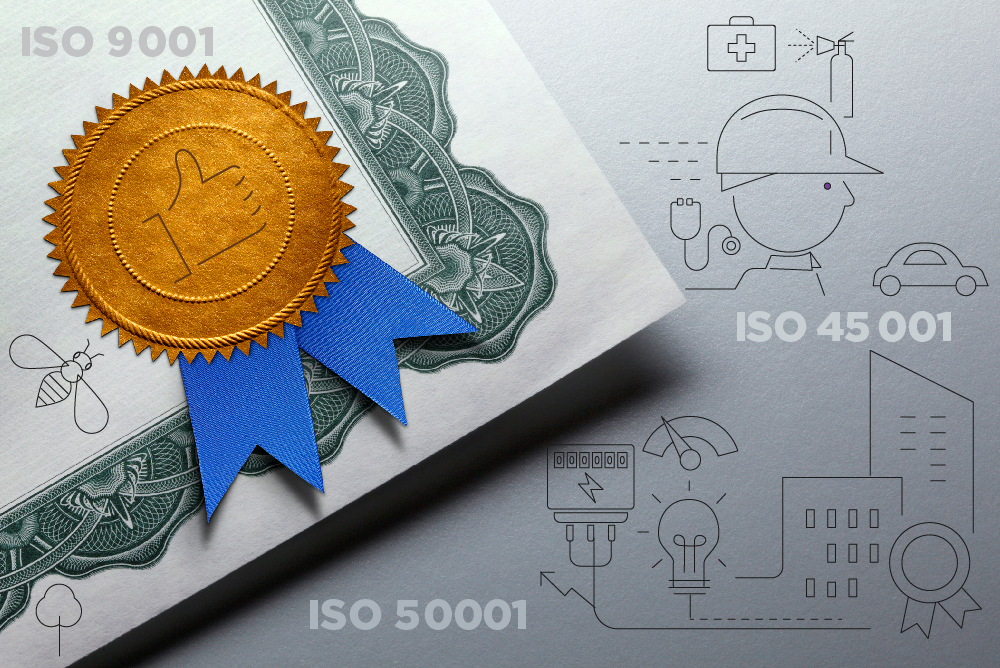
Food safety, data protection, health and safety in the workplace… Companies are integrating societal concerns and adopting voluntary standards to address them… to the point of obtaining certification. This is one of the key findings of the ISO Survey 2019, an extensive survey of all management system certificates issued worldwide. And France is part of this trend.
And you, have you achieved a management system certification in 2019? If so, you’re probably included in these figures. As in previous years, the International Organization for Standardization (ISO) is asking all certification bodies to provide data, country by country, on 12 standards: ISO 9001 (quality), ISO 14001 (environment), ISO/IEC 27001 (information systems), ISO 22000 (food safety), ISO 45001 (occupational health and safety), ISO 13485 (medical devices), ISO 50001 (energy), ISO 22301 (business continuity), ISO 20000-1 (services), ISO 28000 (supply chain security), ISO 37001 (anti-corruption), ISO 39001 (road safety). The certification bodies that are willing to do so pass on their figures, and here’s what it looks like for 6 star certifications in 2019.
ISO 9001: quality on the move
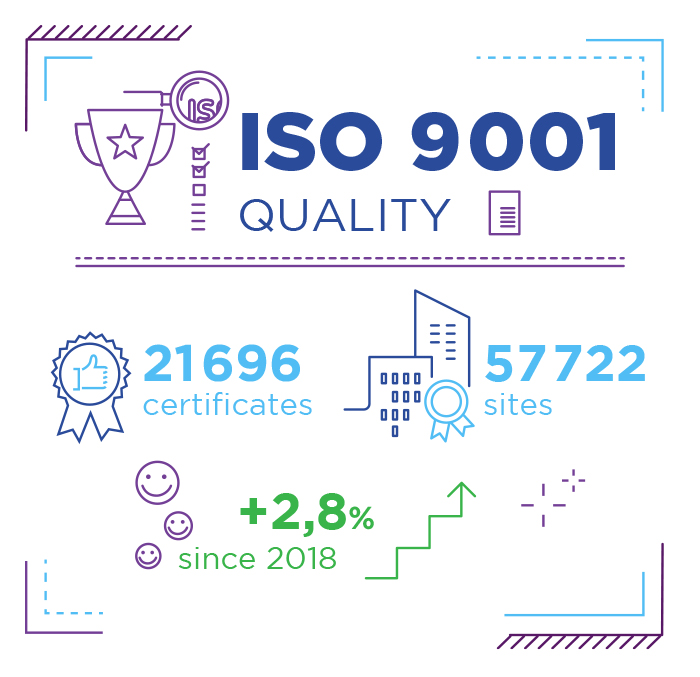
The star standard for certification bodies, ISO 9001 continued its international success in 2019. In one year, the number of certificates worldwide rose from 878,664 to 883,521, a slight increase of 0.5%. Remember that in 2019, as with ISO 14001, only the 2015 version of the standard was eligible for certification. In 2018, the previous version (from 2008) was accepted until September 14. Quality management remains by far the most certified standard, covering over 1.2 million sites worldwide. France, with over 57,700 certified sites, remains in 6th place behind China (281,000), Italy (137,000), Germany (72,000), Japan (82,500) and Spain (59,000). In France, there are slightly fewer certified sites than in 2019, but more active certificates. This means that more customers have applied for certification, but on a smaller scope of activities.
ISO 14001: environmental management wins over
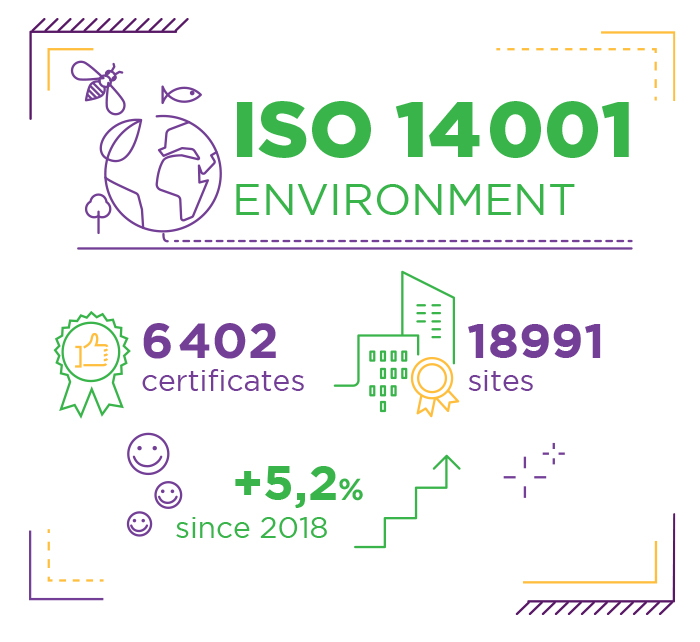
After a period of stagnation, ISO 14001 certification is back on the march in France. The voluntary standard for environmental management now has 6,402 certificates in France, up 5% year-on-year, covering almost 19,000 sites. Worldwide, too, the trend is upwards: 312,000 certificates in total in 2019, compared with 307,000 in 2018. Japan, the UK, Italy and Spain are seeing their number of certificates fall, but Germany (+10%) and China (+15%) are following the same growth trajectory. Other noteworthy developments include South Korea’s entry into the top 10 and the USA’s fall from 9th to 13th place. As for India, it recorded a very strong 32% year-on-year increase, i.e. 2,000 additional certificates in the country! In terms of sectors, construction remains well ahead. Of particular note is the sharp rise in service activities (from 27% to 34% of certificates issued worldwide) compared with industry (from 71% to 65%), and the entry of engineering services into the top 5.
ISO/IEC 27001: in tune with the times
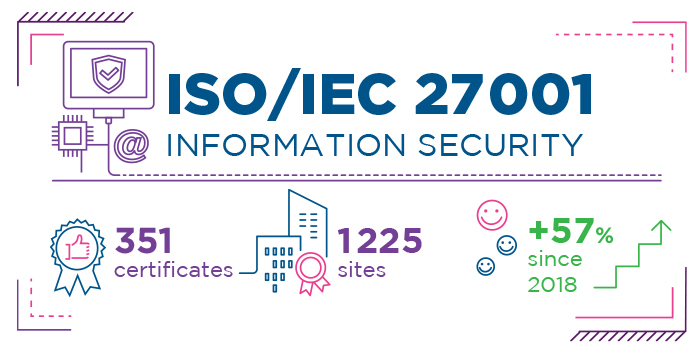
Digital data occupies a predominant place, information systems are developing at breakneck speed, and with them the need to protect them. The ISO/IEC 27001 standard helps protect sensitive data, putting in place measures to prevent hacking and comply with the RGPD, for example. But it remains a management system standard. A sign that French companies are getting to grips with the subject: in just one year, the number of active certificates registered by ISO in France has jumped by 57%, from 220 to 350. On average, a certificate covers 3 and a half sites. Growth can also be seen worldwide, with 36,300 active certificates, an increase of 14% between 2018 and 2019.
ISO 45001: the boom in occupational health and safety
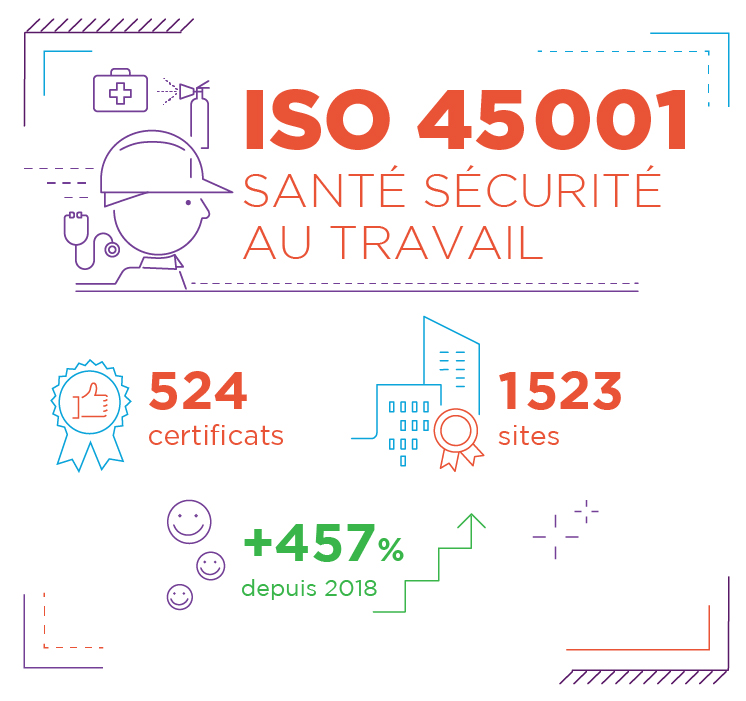
ISO 45001 has only been around since 2018, but the number of companies that have adopted it in a short space of time, even going so far as to get certified, proves the colossal expectations on the subject of occupational health and safety management. While 12,000 structures took the plunge in 2018, by the end of 2019 there were more than 38,000 – more than three times as many! So many companies better equipped to weather storms like Covid-19… Over one year, the increase is particularly marked in France, which goes from 94 certificates issued in 2018 to 524 in 2019. In the vast majority of cases, AFNOR Certification is the issuer of these certificates. In terms of certified sites, France now has 1,500, compared with 200 the previous year (giving a ratio of one certificate for 2.9 sites). Strong growth is set to continue into 2020, for two reasons. Firstly, the pandemic context will reinforce interest in this type of reference system, to protect the health of employees and ensure the long-term viability of the business. Secondly, because of the end of the OHSAS 18001 text, which had been the reference until now. It will be upgraded to ISO 45001, with new certificates to be issued to better adapt to today’s challenges. You can also read our special report on health and safety in the workplace.
ISO 22301: in the spotlight
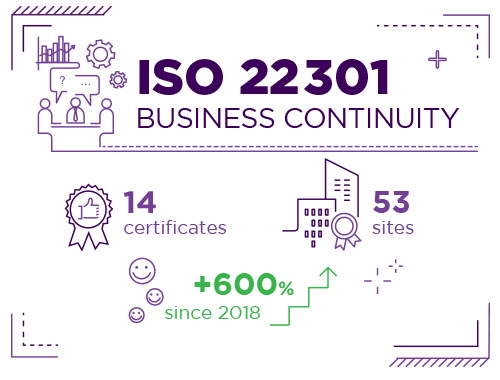
The 14 French players certified in 2019 for their good business continuity management have had the wrong idea. By providing guidelines for building a business continuity plan (BCP), the voluntary ISO 22301 standard resonates with the global health context and the economic upheavals it has spawned… In 2020, at the height of the crisis linked to the covid-19 pandemic, and the containment that followed, anyone who didn’t have a BCP fell by the wayside! In France, only 2 companies and 20 sites held the certification at the end of 2018. One year on, the number of sites has risen to 50, and there’s no doubt that the turbulence of 2020 will generate strong interest in this standard… Worldwide, ISO Survey lists almost 1,700 valid certificates for 6,200 sites. These figures show a slight year-on-year increase, but highlight the lack of anticipation on the part of companies on these vital issues.
ISO 13485: the calm before the storm?
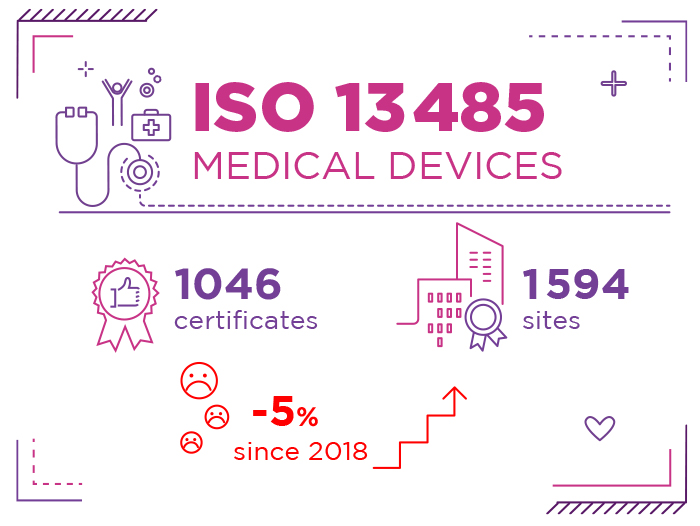
The medical device management standard was slightly down in France in 2019, with 1,046 certificates compared with 1,102 in 2018, and 1,594 sites (- 122). However, ISO 13485 should soon be back in the limelight, at least in Europe, with a new regulation on the subject due to come into force in May 2021, to avoid new scandals like the one involving health-endangering breast implants. This is regulation 2017/745. Initially scheduled to take effect in May 2020, this text has been postponed for a year due to the health context. However, professionals need to organize themselves to deploy methods that will guarantee the safety of their products throughout their lifecycle. And by presenting ISO 13485 certification (2016 version, the latest to date), they are already reassuring their customers about this ability to control risks.